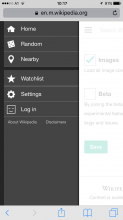Hi @Wittylama and @Fuzheado, I am the lead product manager for 'reading' at the foundation. I am sorry you felt rebuffed on ticket T117970 and I agree that the mobile development has been working in relative obscurity. Most of that has had to do with little engagement from outside, but we can ramp up as appropriate
Regarding this:
Clearly the WMF has decided that it is sick of having no influence on design in the desktop environment (and it should have a lot more than it does), and instead has created a community-free-zone in mobile.
I want to challenge this notion and put forward a potentially equally upsetting one that has at least driven my thinking to date, but would benefit from your thoughts: A separate experience for reading. To date, the mobile experience has not been geared towards editors. And as a result, it is actually a very clean reading experience with no 'wormhole links' (disorienting jumps to confusing pages). Try to imagine being a non-editor clicking the 'wikidata item' link from the left-hand nav of an article or featured content.
As editors migrate to mobile, we can and should promote and accommodate that transition. However, I am very reluctant to lose the sanctuary we have created for readers and the simplicity of the left-hand menu. Wikipedia is at the least two different sites crammed into one and while reading-->editing-->admin feel like a natural funnel, there is no real need for 99% of our readers to see admin tools. In the past 6 months we have eplored two interesting ways to accomplish this:
- including an easy link to talk pages in mobile if a user has more than 5 edits: T54165
- Creating a notice page for users who click on red links (instead of dumping them into a blank editor (more blank on mobile) described in the comments here: T100256
I don't know if 'admin' or 'advanced' mode is what we should be aiming for or what, but I do think we need to figure out a way to put the tools editors and admins need into a mobile device without overwhelming our readers on a tiny screen and enabling new users to discover and get hooked on volunteering.
What do you think?
